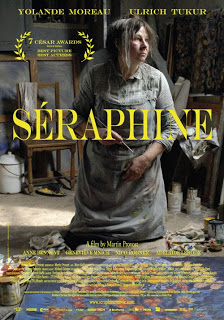Seraphine
We previewed Seraphine in June of last year, when it was opening in select cities. Now you can rent it on DVD.
amazon.com synopsis:
Séraphine is an elegantly fictionalized biopic about 19th century modern primitive painter, Séraphine de Senlis, who was a contemporary of Henri Rousseau’s. The tale spans approximately 25 years during which Séraphine and her champion, German art critic and collector, Wilhelm Uhde, survive two wars and drastic economic changes that affect the art market. Martin Provost’s feature is completely character driven, and as such relies on Yolande Moreau’s caring portrayal of the eccentric Séraphine, and Ulrich Tukur’s calm, academic demeanor as Mr. Uhde. In Provost’s telling of this virtually unknown story, Séraphine is a middle-aged woman working as a housekeeper in Senlis, France, when Uhde arrives as a guest and discovers that this odd woman is a talented visionary artist. Since Uhde’s main focus is garnering respect and precious Parisian salon space for artists deemed “naive,” it is an uncanny and fortuitous coincidence that he stumbles upon Séraphine.
Sarah Boslaugh writes,
In one of those strokes of luck upon which lives can turn, the art dealer Wilhelm Uhde (Ulrich Rukur) sees one of her paintings at a neighbor’s house. An early champion of Picasso and the primitive painter Henri Rousseau, Uhde recognizes her raw talent and becomes her patron. Besides his professional interest in her art, he may be motivated by the fact that they are both isolated outsiders, she by her poverty and mental illness, he by his German nationality and homosexuality (the latter is underplayed in the film).
In his review, “The Vision of an Uncanny Painter,” A.O. Scott writes:
… the director is properly immersed in the sensual and spiritual dimensions of Séraphine’s art, which grows out of an ecstatic — both in the erotic and religious sense — engagement with the natural world. She paints fruits and flowers in arrangements that at first look merely decorative, like the patterns on wallpaper or pottery, but that on closer examination are charged with a marvelous and unsettling power.
Kenneth Turan of the L.A. Times writes:
A long time is spent with Seraphine and her daily routines in the town of Senlis before we have any notion of her as an artist. Stolid and seemingly simple, Seraphine is treated like a piece of furniture by the people she works for, but in her private moments we sense a yearning in her spirit, an unspoken, almost pagan passion for nature in all its manifestations.
When we do see her paintings of flowers and trees, we come to understand that making art is a holy act for Seraphine.
She paints because of a kind of spiritual compulsion, as if she were a devout member of a religion with but a single worshiper. Art is not a choice or an option, but a brutal necessity.
In her review, Liz Braun writes,
Seraphine is a film about the painter Seraphine Louis, a scrubwoman from the French village of Senlis whose paintings hang in museums around the world.
For the subversive among you, the movie is also a commentary on the class divisions and other pesky social inequities that abound in the art world.
You can also listen to a review/discussion of the film on NPR.

